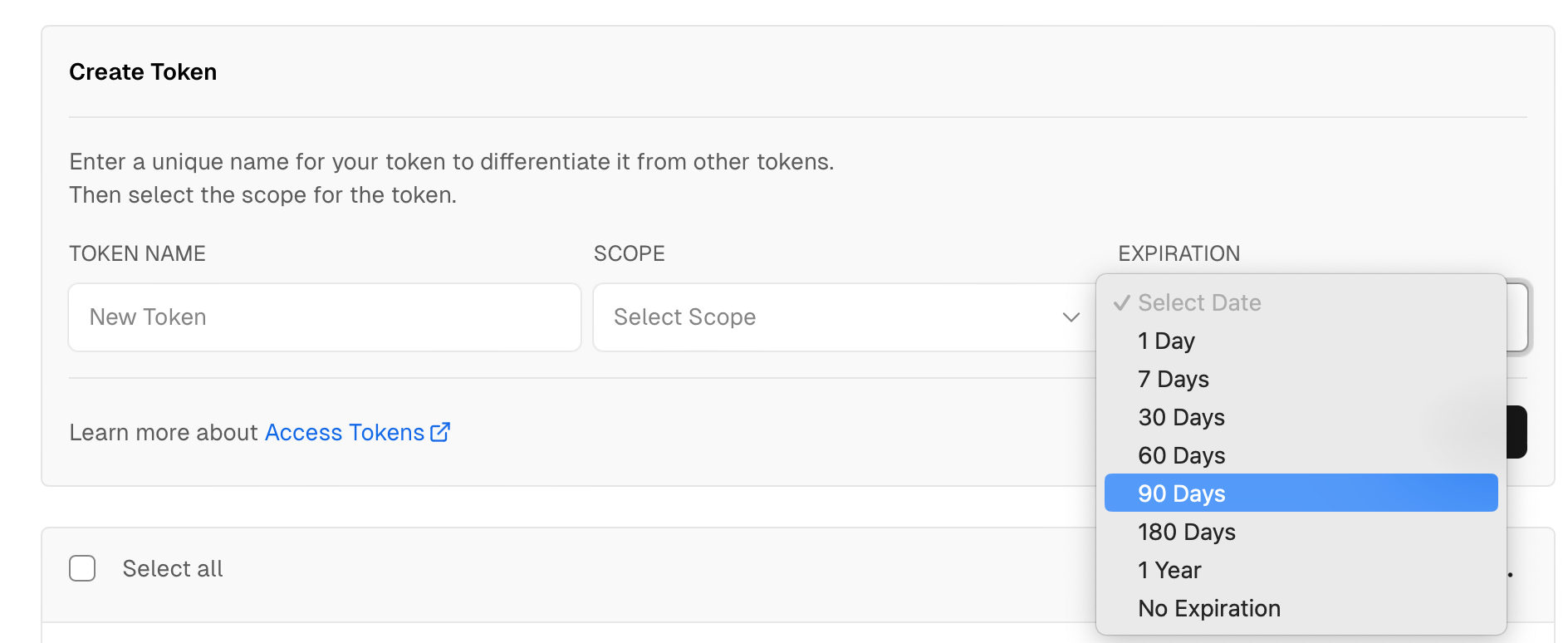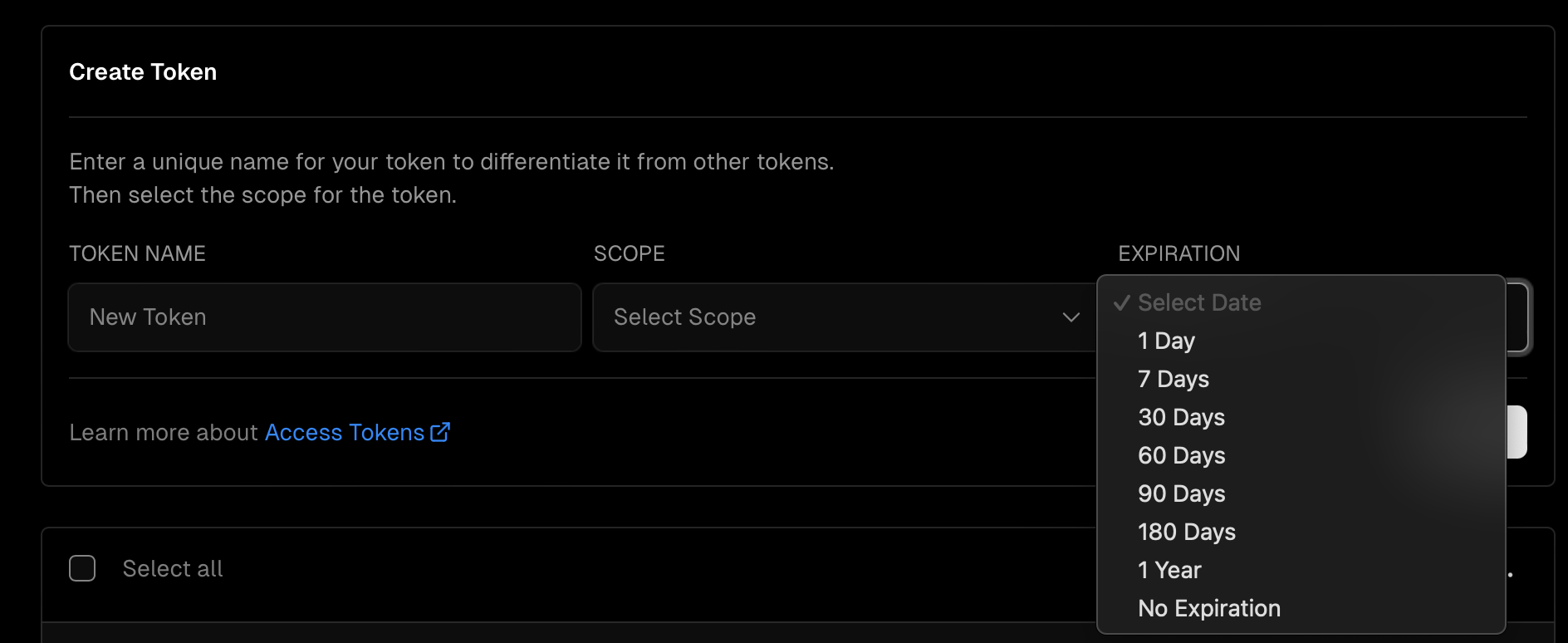Using the REST API
Interact programmatically with your Vercel account using the SDK or direct HTTP requests.
To view all endpoints, and explore code examples with the SDK and direct API calls, see the reference endpoints documentation.
- Use the Vercel SDK by first instantiating with your token
- Use the language of your choice by calling the endpoints directly and providing your token
API Basics
Our API is exposed as an HTTP/1 and HTTP/2 service over SSL. All endpoints live under the URLhttps://api.vercel.com and then generally follow the REST architecture.
Server Specs
HTTP and TLS
The API supports HTTP versions 1, 1.1, and 2, although HTTP/2 is preferred. TLS versions 1.2 and 1.3 are supported, with resumption. For more information on TLS support, refer to the SSL Labs report.Content Type
All requests must be encoded as JSON with the Content-Type: application/json header. If not otherwise specified, responses from the Vercel API, including errors, are encoded exclusively as JSON as well.Authentication
Vercel Access Tokens are required to authenticate and use the Vercel API.Creating an Access Token
Access Tokens can be created and managed from inside your account settings.

- In the upper-right corner of your dashboard, click your profile picture, then select Settings
- Select Tokens from the sidebar
- Enter a descriptive name for the token
- Choose the scope from the list of Teams in the drop-down menu. The scope ensures that only your specified Team(s) can use an Access Token
- From the drop-down, select an expiration date for the Token
- Click Create Token
- Once you’ve created an Access Token, securely store the value as it will not be shown again.
Expiration
Setting an expiration date on an Access Token is highly recommended and is considered one of the standard security practices that helps keep your information secure. You can select from a default list of expiration dates ranging from 1 day to 1 year. You can view the expiration date of your Access Tokens on the tokens page.Accessing Resources Owned by a Team
By default, you can access resources contained within your own user account (personal). To access resources owned by a team, or create a project for a specific team, you must first find the Team ID. After you obtained the Team ID, append it as a query string at the end of the API endpoint URL:Failed Authentication
If authentication is unsuccessful for a request, the error status code 403 is returned.Types
The following is a list of the types of data used within the Vercel API:| Name | Definition | Example |
|---|---|---|
| ID | A unique value used to identify resources. | "V0fra8eEgQwEpFhYG2vTzC3K" |
| String | A string is a sequence of characters used to represent text. | "value" |
| Integer | An integer is a number without decimals. | 1234 |
| Float | A float is a number with decimals. | 12.34 |
| Map | A data structure with a list of values assigned to a unique key. | { "key": "value" } |
| List | A data structure with only a list of values separated by a comma. | ["value", 1234, 12.34] |
| Enum | An Enum is a String with only a few possible valid values. | A or B |
| Date | An Integer representing a date in milliseconds since the UNIX epoch. | 1540095775941 |
| IsoDate | A String representing a date in the 8601 format. | YYYY-MM-DDTHH:mm:ssZ |
| Boolean | A Boolean is a type of two possible values representing true or false. | true |
Pagination
When the API response includes an array of records, a pagination object is returned when the total number of records present is greater than the limit per request. The default value of this limit is 20 but it can be changed by passing a value to the query parameterlimit when the request is made. The maximum possible value of limit is 100.
You can then use the pagination object to make additional requests and obtain all the records.
The pagination object is structured as shown in the example below:
pagination-structure
- Send a request to the same API endpoint
- Include the query parameter
untilwith a value equal to the timestamp value ofnextreturned in the previous request - Repeat this sequence until the pagination object has a
nextvalue ofnull
Node.js to save all the projects in your personal account to a json file:
pagination-example.js
Rate Limits
We limit the number of calls you can make over a certain period of time. Rate limits vary and are specified by the following header in all responses:| Header | Description |
|---|---|
X-RateLimit-Limit | The maximum number of requests that the consumer is permitted to make. |
X-RateLimit-Remaining | The number of requests remaining in the current rate limit window. |
X-RateLimit-Reset | The time at which the current rate limit window resets in UTC epoch seconds. |
error-response
You can find the complete list of rate limits in the limits
documentation.
Versioning
All endpoints and examples are designated with a specific version. Versions vary per endpoint and are not global. The response shape of a certain endpoint is not guaranteed to be fixed over time. In particular, we might add new keys to responses without bumping a version endpoint, which will be noted in the changelog. To ensure the security and correctness of your application, make sure to only read the keys from the response that your application needs. Don’t proxy entire responses to third-parties without validation. Old versions of each endpoint are supported for as long as possible. When we intend to deprecate, we will notify users in the changelog section. Endpoint versions follow the base URL and come before the endpoint. For example:version-endpoint
6 of the deployments
endpoint.
